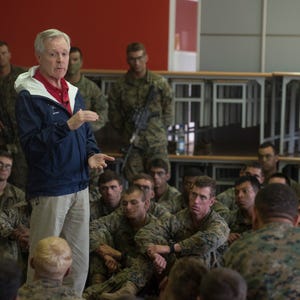http://www.marinecorpstimes.com/story/military/2016/06/27/marines-remove-word-man-these-19-job-titles/86438594/?utm_source=Sailthru&utm_medium=email&utm_campaign=Defense+EBB+6-28-16&utm_term=Editorial+-+Early+Bird+Brief
Thousands of Marines serving throughout the infantry and in other key positions are about to get new gender-neutral job titles, but the service’s top leaders are pushing to leave the word “man” in some of its most iconic occupations.
In all, the Marine Corps plans to rename 19 of its military occupational specialties, or MOSs, as the result of a months-long review mandated by Navy Secretary Ray Mabus. A service-wide message announcing the changes is expected to be published within the next few days.
The terms “rifleman” and “mortarman,” are among those that remain untouched, according to a list — obtained by Marine Corps Times on Monday — of 33 MOSs that were reviewed. And that was by careful design, said a Marine official who spoke on the condition of anonymity.
“Names that were not changed, like rifleman, are steeped in Marine Corps history and ethos,” the official said. “Things that were changed needed to be updated to align with other MOS names.”
In most cases, the word “man” will be replaced by Marine. Those changes are as follows:
- Basic infantry Marine.
- Riverine assault craft Marine.
- Light-armor vehicle Marine.
- Reconnaissance Marine (to include three other recon-related jobs that include the word “man”).
- Infantry assault Marine.
- Basic field artillery Marine.
- Field artillery fire control Marine.
- Field artillery sensor support Marine.
- Fire support Marine.
- Basic engineer, construction and equipment Marine.
- Basic tank and assault amphibious vehicle Marine.
- Armor Marine.
- Amphibious assault vehicle Marine.
- Amphibious combat vehicle Marine.
The field artillery operations man MOS is expected to be changed to field artillery operations chief, since that position is typically held by a Marine in the rank of staff sergeant or above.
The anti-tank missileman MOS is the only position that will pick up the word “gunner” in place of “man.”
Others on the list — like manpower officer or vertical takeoff unmanned aerial vehicle specialist — will still include the word “man” because it’s part of a word that doesn’t describe the Marine doing the job.
In addition to the service-wide message that will address the changes, the Marine Corps plans to update its MOS manual, the official said. The full review included more than 33 MOSs, but many weren’t affected because they already include gender-neutral descriptors like “specialist” or “chief.”
Mabus directed the Marine Corps and Navy to review its job titles and descriptions in January, a month after Defense Secretary Ash Carter announced that all military jobs would open to women.
“As we achieve full integration of the force … this is an opportunity to update the position titles and descriptions themselves to demonstrate through this language that women are included in these MOSs,” Mabus wrote in a January order to Commandant Gen. Robert Neller. “Please review the position titles throughout the Marine Corps and ensure that they are gender-integrated as well, removing ‘man’ from the titles.”
The Navy’s review has broadened beyond its original mission of removing the word “man” from as many as 21 job titles and rating names. That review could ax newer titles like aircrew survival equipmentman, as well as timeless ones such as corpsman and yeoman — even seaman.
As of late June, no decisions had been made. The Navy has called for a second review of the proposals, a process likely to take a few months.
The move has proved unpopular with many Marines and sailors, with several branding it political correctness run amok.
“We have reached peak crazy,” one reader commented on an earlier story by Marine Corps Times about this topic.
“If a woman isn’t going to consider making the Navy her career because she is called a fireman or a corpsman, then I don’t think she was going to make the Navy a career period,” another reader commented on a Navy Times story. “We don’t need [people who are easily offended] like that clogging up the institutions that protect our country.”
Senior Reporter Mark D. Faram contributed to this report.





